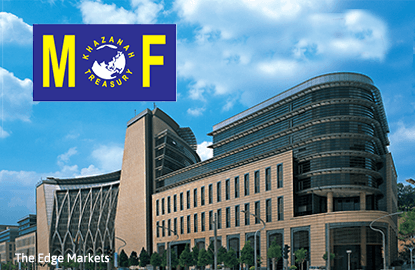
This article first appeared in Corporate, The Edge Malaysia Weekly, on May 16 - 22, 2016.
A key problem with 1Malaysia Development Bhd (1MDB) has been a lack of consistency in its assertions.
For instance, a favourite claim of officials previously was that because a sizeable chunk of 1MDB’s loans was not guaranteed by the government, the latter was not liable for it. And this was notwithstanding the fact that 1MDB was a wholly-owned subsidiary of the Minister of Finance (MoF) Inc.
Now, however, it is clear that MoF will assume all of 1MDB’s debts while the assets of the strategic investment arm will be transferred to the ministry.
In explaining the move, a MoF official says, “It’s not just about 1MDB anymore; there are partners such as [Australian] Lendlease [to develop Tun Razak Exchange] and others who will face difficulty. The 1MDB name is tarnished … it is even difficult to open bank accounts, let alone seek funding for 1MDB-related projects.”
There are other issues that have also raised concerns.
For instance JP Morgan recently downgraded Malaysia to “underweight” from “neutral”, citing the “ongoing investigations of the 1MDB scandal outside Malaysia [that have] increased perceived country risk” as one of the reasons for it.
It is also difficult to gauge the extent of the damage — debts amassed — because 1MDB’s financial statements for its financial year ended March 31, 2015, have not been released. According to its president and executive director Arul Kanda Kandasamy, the strategic investment fund has total remaining debts of RM24 billion and a cash surplus of RM2.3 billion after a recent disposal of assets and debt repayment.
Early last month, 1MDB was given a second six-month extension by the Companies Commission of Malaysia to file its financial statements, which means its March 2105 statements will be submitted in September.
Its financial statements for FY2014 were released in November 2014 and indicated that the strategic investment fund had suffered a net loss of RM665.36 million on revenue of RM4.26 billion.
As at March 31, 2014, 1MDB’s non-current assets stood at RM31.88 billion and current assets at RM19.53 billion while its non-current liabilities came up to RM37.84 billion and current liabilities to RM11.13 billion.
There have been reports of a RM25.5 billion hole at 1MDB but these were dismissed by its management. Lately, however, there seems to have been a change of tune with the possibility of fraud being highlighted, albeit in relation to the payment of sums to Aabar Investments PJS registered in the British Virgin Islands (BVI).
To recap, on June 4 last year, International Petroleum Investment Co (IPIC) and its unit Aabar Investments PJS assumed cash-strapped 1MDB’s obligation to pay interest payments of US$50 million which were due on debt paper of US$3.5 billion. The two went as far as to forward a US$1 billion loan to 1MDB.
The debt paper comprises two tranches of US$1.75 billion 10-year bonds issued in May and October 2012, and US$2 billion in interest, which works out to a total of US$5.5 billion in total exposure for IPIC.
In return for the assistance, 1MDB transferred US$855 million, US$933 million and US$295 million over two years from 2012 onwards and forked out a US$1.4 billion security deposit to Aabar Investments PJS BVI, which was wound up in June last year.
IPIC and Aabar Investments PJS are now saying that the BVI company is not linked to them while 1MDB is saying otherwise. The fear is that Malaysian parties were acting in concert with the Middle Eastern parties.
“These days, money is usually moved via wire transactions, so it should be easy for 1MDB to show it made the requisite payments,” the MoF official says.
He adds that IPIC and Aabar Investments PJS cannot deny receiving the payment of US$3.5 billion as all the agreements and discussions on Aabar BVI were with Khadem al-Qubaisi, the former managing director of IPIC who was also chairman of Aabar Investments, and Mohamed Badawy Al Husseiny, the former CEO of Aabar Investments.
“From what I know, in the Middle East, no official will do such a thing — embezzle funds — because the penalties are heavy,” says the official.
There are questions as to how an experienced and highly paid banker like Arul was not aware that Aabar Investments PJS BVI had been wound up. So, while Arul came into 1MDB only in January 2015, he could take a lot of flak as well.
But then again, will there be any accountability?
In contrast to 1MDB, in May 2010, Sime Darby Bhd removed its CEO Datuk Ahmad Zubir Murshid, holding him responsible for cost overruns in Qatar and the Bakun hydroelectric dam. In FY2010, Sime Darby’s provisions and impairments for the energy and utilities division amounted to RM2.1 billion.
Zubir was also charged with criminal breach of trust and cheating in relation to the acquisition of native customary rights land in Sarawak. The case is ongoing.
In the case of 1MDB, its former CEO Datuk Shahrol Azral Ibrahim Halmi joined the Performance Management and Delivery Unit (Pemandu), which is part of the Prime Minister’s Department, after he left the strategic investment fund.
In its report on 1MDB, the Public Accounts Committee says Shahrol and others related to the company should be probed by the authorities for weak governance.
In a statement earlier this month, MoF accepted the resignation of the board of 1MDB but it remains to be seen whether any punishment will be meted out.
But then again, this is 1MDB — in Arul’s words, “the most investigated company in the country”. Yet it remains as opaque as ever.
Save by subscribing to us for your print and/or digital copy.
P/S: The Edge is also available on Apple's AppStore and Androids' Google Play.